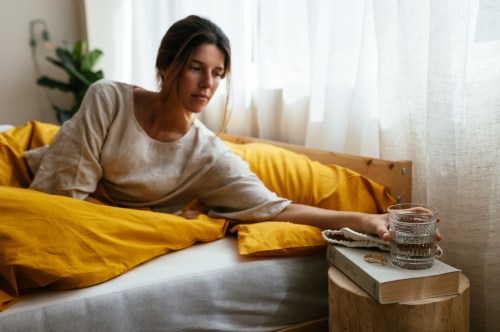There are countless reasons why you’d make it your mission to sip on more H2O. (And yes, this goes well beyond buying into the recent Stanley tumbler craze). Perhaps you wake up parched every morning, need to alleviate constipation, or even want to promote a better mood. By and large, most people could stand to boost their daily hydration game… but there are a few instances in which you might actually want to hold back on drinking water.
Experts in This Article
Brooklyn–based registered dietitian
To find out when and why it could be wise to do so, we tapped (sorry!) Maddie Pasquariello, MS, RDN, of East Coast Health in Brooklyn, New York.
When to avoid drinking water, according to a dietitian
1. Close to bedtime
If you have nocturia (i.e., frequent nighttime awakenings to relieve your bladder), you might be drinking too much leading up to bedtime. “If you’re chugging water or tea before turning out the light, consider spacing your water intake more evenly throughout the day,” Pasquariello advises. Try to avoid water for at least an hour or so before bedtime.
Of course, peeing before you crawl into bed is also smart. But if you still wake up often before sunrise to relieve yourself, she warns that it could signal something more serious—like a UTI, overactive bladder, or another condition that’ll warrant a physician’s attention.
2. At night to make up for a lack of hydrating earlier in the day
Some people realize closer to nightfall that they’ve barely had any water throughout the day, choosing to chug in the evenings to make up for lost time (and lost hydration potential). Even if you do this well before bedtime, drinking too much at once isn’t ideal. “It’s generally agreed that sipping water throughout the day, rather than chugging large amounts at one time, is the way to go,” Pasquariello shares. “This keeps strain off the kidneys while keeping us well-hydrated, and helps us avoid bloating or stomach upset.” Naturally, overcompensating to hydrate after sunset may also potentially reduce your twilight trips to the loo.
“It’s generally agreed that sipping water throughout the day, rather than chugging large amounts at one time, is the way to go,” Pasquariello shares. “This keeps strain off the kidneys while keeping us well-hydrated, and helps us avoid bloating or stomach upset.” —Maddie Pasquariello, MS, RDN
However, Pasquariello says that there are some times in which chugging H2O is expected and fairly normal for most people, like after a sweaty workout or on a hot day. “Adult kidneys can eliminate about a liter of water per hour, so that’s a good limit to stick to,” she adds.
3. Shortly before working out
Of course, you’ll want to be hydrated before breaking a sweat, but try to avoid sipping on too much too soon before your workout. “Most people will not want to chug water right before going on a run or doing cardio, or while working out in general, mainly because it can lead to discomfort—such as a feeling of heaviness or even nausea or abdominal pain during your workout,” Pasquariello shares. Instead, she advises keeping tabs on your hydration status well before and after your workout.
“Generally speaking, it’s important to consume a glass or two of water at least two hours before you work out as well as after. And then add a few ounces for every 10 to 20 minutes of exercise, depending on the fluids lost,” Pasquariello explains. For some people, super sweaty workouts like hot yoga and intense cardio might warrant bumping up your fluid intake to 10 ounces every 10 minutes, she adds. And when you do need to drink up while working out, she suggests taking small sips in between sets, moves, and laps, or during a brief rest period.
“Generally speaking, it’s important to consume a glass or two of water at least two hours before you work out, as well as after. And then add a few ounces for every 10 to 20 minutes of exercise, depending on the fluids lost.”
4. When you don’t have immediate access to a bathroom
You might not want to drink a sizable amount of water (or any other fluids, for that matter) during long commutes and other times in which it’ll be tough to find or access a restroom. “Holding in urine for a long time can strain your bladder muscles. If you’re doing this consistently, the strength of your pelvic floor can suffer,” Pasquariello warns. Holding it in every once in a while is unlikely to lead to significant issues, she adds; just aim to not make it a habit.
5. To compensate for stress
“Stress and anxiety before a big game, test, or presentation can definitely cause some people to drink more, which can be chalked up to nerves,” says Pasquariello—whether that’s water, caffeine, or other fluids. (Others might also reach for alcoholic “liquid courage” before a social event.) “But if you’re actually experiencing excess thirst, or urination at times that are outside of the norm such as bedwetting, this is something to address with your doctor,” she continues.
Again, experiencing this every so often isn’t a big deal, but routinely drinking too much at once can risk discomfort and kidney strain.
When to avoid drinking water: The bottom line
Although there are certain times when it could be in your best interest to avoid drinking water—most of them involving drinking too much in one go—many of us could benefit from drinking more, not less, throughout the day.
Moreover, Pasquariello notes that while you should be aware of the signs and risks of dehydration and overhydration alike, you don’t need to add them to your list of things to stress over. “It’s important not to create any added fear around drinking water, and being well-hydrated shouldn’t pose an inconvenience to daily life,” she concludes. “Just drink your water, within limits, and let your body do its thing!”
Sign Up for Our Daily Newsletter
Get all the latest in wellness, trends, food, fitness, beauty, and more delivered right to your inbox.
Got it, you've been added to our email list.










